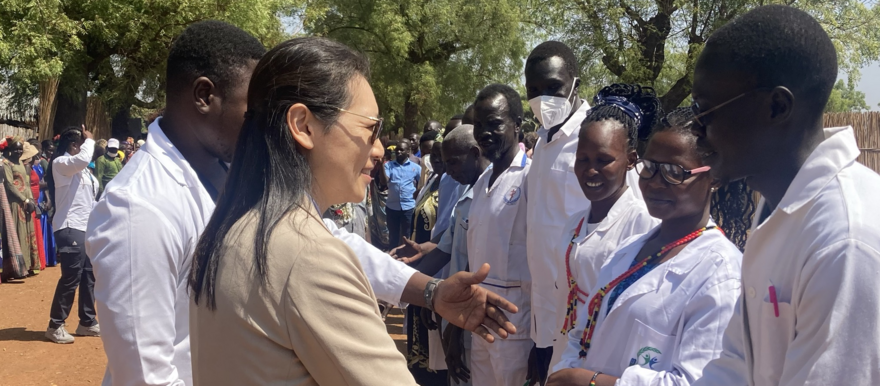In a significant event marking the progress in gender-responsive healthcare services amid humanitarian challenges, the Embassy of Japan on Thursday handed over a renovated health facility equipped with essential amenities and powered by solar energy to authorities in Mangala. The facility will bolster COVID-19 prevention and address gender-based violence among vulnerable communities.
The handover ceremony of the Mangala Primary Healthcare Center witnessed notable dignitaries including Deputy Chief of Mission Wanatabe Tomoko from the Embassy of Japan, Central Equatoria’s Minister of Health, Nejua Juma Mursal, and UN Women Deputy Rukaya Mohammed. Woman representative Esther Kaku Jacob from women groups in Mangala, Deputy Director Luberi Mathew, Primary Health Care, Central Equatoria State; and Project Implementing Partner William Deng also attended the occasion.
“I am delighted to be here today. A year ago, I had the privilege of participating in the ‘Dignity Kit Distribution’ at IDP Camp 3. This initiative is part of a broader project aimed at establishing a supportive environment for women IDPs and host communities, facilitating the adoption of gender-responsive health services to curb the further spread of COVID-19 in a humanitarian context. I am pleased to return for another handover ceremony organized by UN Women,” said Deputy Chief of Mission Wanatabe Tomoko from the Embassy of Japan.
“In the context of this project, I hope that IDPs and members of the host community have enhanced their understanding of COVID-19 and gender-based violence (GBV). This encompasses knowledge about COVID-19 transmission and prevention, incorporating various preventive measures such as handwashing, the use of hand sanitizers, and face masks, among others,” added Wanatabe.
“I’ve just visited the newly renovated Mangala PHCC facility. The upgrades include a new roof, a ramp for disabled access, installed power for lighting, and the partitioning of some rooms. These improvements have led to an increased demand for services such as COVID-19 testing and vaccination, as well as improved hygiene standards. Importantly, these renovations have made the facility more accessible for women and girls using wheelchairs, with sufficient rooms now available for their use. Additionally, the installation of solar power has enhanced protection against gender-based violence (GBV), particularly for women and girls requiring emergency services at night,” explained Wanatabe, Deputy Chief of Mission at the Embassy of Japan.
Wanatabe expressed gratitude to UN Women and implementing partner ASSIMO for their contributions. “Japan has been actively supporting South Sudan’s journey towards durable peace and nation-building since its independence,” he said.
“Japan remains confident in South Sudan’s ability to complete the peace agreement. Above all, we are committed to supporting the self-sustainability efforts of the South Sudanese people and improving the lives of the most vulnerable, including women and children. Japan’s commitment to supporting South Sudan’s path to durable peace and nation-building will endure,” Wanatabe concluded.




